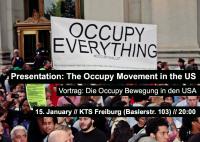An overview of the Occupy movement
Following the Greek resistance movement, Arab Spring, and 15M movement in Spain, frustration began to build within the US due to the inequality perpetuated by the capitalist system and the encroaching ability of banks and multinational corporations to influence policy and drown out the voice of the people.
A large social movement in the United States was sparked by an Adbuster’s campaign in 2011, which brought more than 1,000 people out to demonstrate on Wall Street on September 17.
Following this initial day of demonstrating, people around the US came out in groups - into the streets, to local assemblies, in front of politicians’ offices and entrances to banks - to occupy public spaces, voice their frustrations, and demand change.
This movement faced wide criticism by people belonging to both of the two major political parties in the United States, stigmas perpetuated in the media, social isolation, and internal incoherence.
Police responded with illegitimate arrests of protesters and politicians manipulated laws to limit the efficacy of the movement, the might of which has now greatly been extinguished in most cities.
Addressed in this presentation...
- What happened to the potential of this large movement within the United Sates? What caused it to lose momentum?
- What can other social movements learn from Occupy?
- What successes have been seen?
- What does the future of social activism and change look like for the United States?
The presentation includes interviews with activists from around the US who took part in Occupy, and specific accounts of the current political and social atmosphere in Chicago.
About the presenter:
Having grown up in a rather liberal town in Ohio with very conservative parents, I caught glimpses of - and was intrigued by - the leftist leaning mindsets of my friends' parents, yet always felt the need to stifle my political dissent around family. While traveling in Europe I saw alternative political systems and, while these are certainly not perfect models, the narrow window of political opinion recognized in the United States, as well as the power of consumerism in shaping our policies, became disturbingly clear.
While studying and teaching in Chicago, the most overtly gentrified city in the United States, my personal degree of frustration with inequality grew and I slowly began to develop a sense of social agency. The occupy movement gave me hope at one time, but now the movement has been seriously weakened and in the meantime the 1% have grown richer and more influential.
My first goal in giving this presentation is to provide a depiction of activism and activists in the United States, based on personal experiences and interviews - because I believe there has been some misrepresentation in the media. Secondly, I will provide my brief analysis of the successes and failures of the Occupy movement, in hopes that you will respond. Collectively we can learn something from this movement that may be useful for demonstrations in the future. I welcome questions and hope that this presentation becomes something useful.
The presentation will be in english language.
15.01 // KTS Freiburg (Baslerstr. 103) // 20:00

